Topical Relevance: 9 Tips on How to Create Content Google Can’t Ignore

When you buy something through one of the links on our site, we may earn an affiliate commission.
Want to know how to use topical relevance to dominate your niche and improve search rankings?
Well, this article has you covered.
Here are some benefits of topical relevance: It helps Google understand what your blog is about. It helps you rank with less domain authority and backlinks. It can help you establish expertise and trust in your niche. And a whole lot more that we'll get into in this article.
In this post, I’ll explain exactly what topical relevance is and 9 ways you can use it to your advantage.
Let’s get started.
Contents
What is Topical Relevance?
Topical relevance is the process of making your content more relevant in the eyes of Google.
Google also uses this process to determine how relevant a piece of content is for a given search query.
Topical relevance requires several factors, including:
- Content
- Backlinks
- Keywords
When a web page has more topical relevance, it is more likely to appear higher up in Google results.
9 Ways to Improve Topical Relevance on Your Blog
Here are 9 practical ways you can use topical relevance to improve content quality, search engine rankings, and traffic to your blog.
1. Perform topical keyword research
A lot of bloggers get keyword research all wrong.
They choose a niche and then go after any keyword related to that niche.
For example, someone in the coffee niche might include the following:
-
How to make a skinny latte
-
What are the best espresso machines?
-
Where do coffee beans grow?
There’s nothing wrong with each of these, but they aren’t topically relevant.
A better approach would be to choose 1 specific topic within your niche and find keywords related only to that topic.
The easiest way to do this is by reverse engineering keywords from another website using one of the best keyword research tools.
Take the URL of one of your competitors and run it through your keyword tool of choice.
I’m using Serpstat:
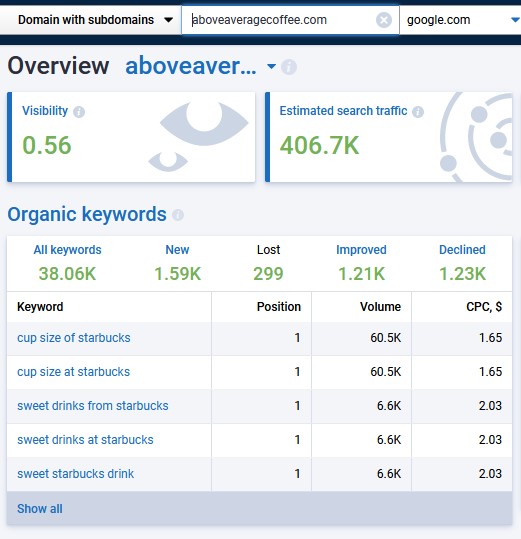
Click on the organic keywords and use a filter to only return keywords related to your chosen topic.
I have also filtered to only return question-related keywords:
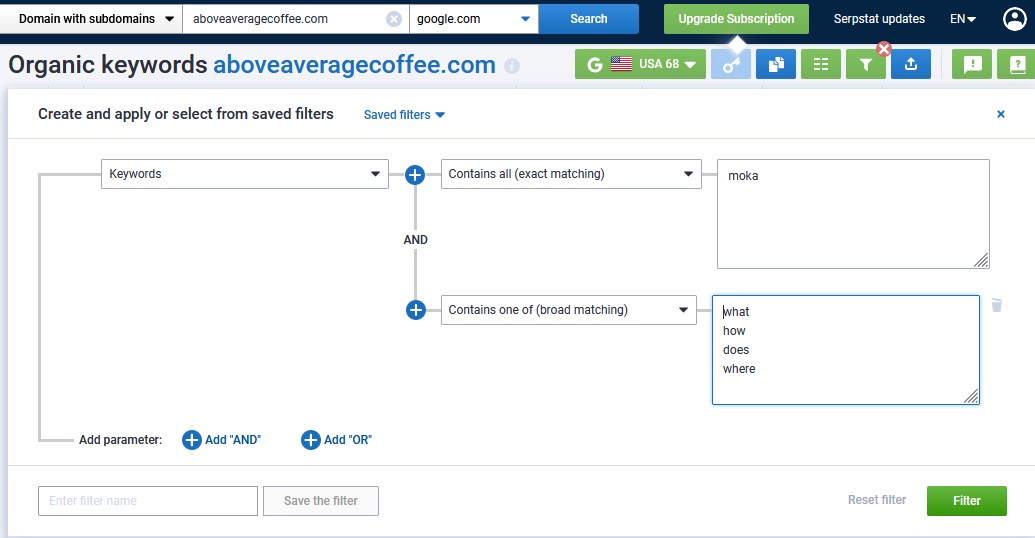
You can see that the selected keyword only relates to 1 specific topic (moka) within the coffee niche (check out coffee affiliate programs):
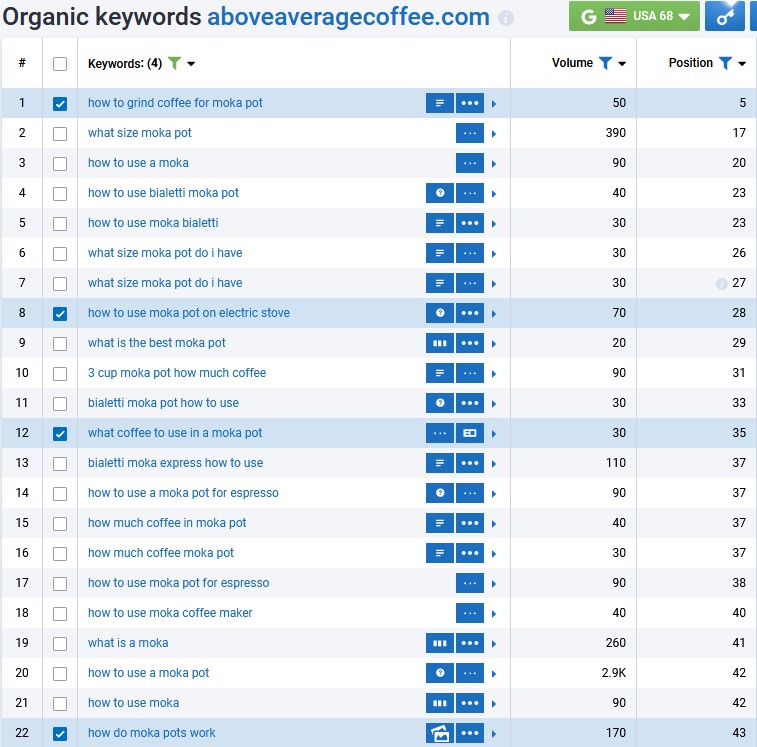
Doing keyword research this way creates hyper-relevancy that Google can’t ignore.
2. Understand keyword intent
Ranking a piece of content high in Google largely comes down to understanding the search intent of the keyword being searched.
The definition of search or keyword intent is what the phrase means from the perspective of the searcher.
For example, “webcams” could mean different things, but it is likely the intention behind the search is for the searcher to buy a webcam.
Someone searching “best webcams”, isn’t ready to buy one and instead, wants to learn which is the best webcam to buy.
Misinterpret the intent of a keyword and you’ll most likely never rank for it.
If the intention behind the keyword isn’t clear, do a Google search to see what the results are showing.
This will give you an idea of the meaning of the phrase people are searching for.
3. Use long tail keywords
Using long tail keywords as part of your content strategy has a variety of benefits.
- They require fewer backlinks
- Are less competitive
- Help you
But long tail keywords also play a large role in establishing topical relevance. Here’s how.
When you target long tail keywords, you get a level of specificity that other keywords lack.
For instance, the query “how to lose weight” is very broad and difficult for search engines to identity who the intended audience is.
The only way an article under this title would rank is with a high domain authority and thousands of backlinks.
But, a long tail keyword such as “how to lose weight with ibs” is more targeted towards a specific group of people.
Using long tail keywords increases topical weight to the content and allows you to get more granular with the information you share.
You can also use long tail keywords in articles as supporting content that links back to more competitive and broader terms.
4. Add contextual information
Context adds further meaning and reasoning to a concept or argument.
The reason this is important is that many people like to understand things on a deeper level in addition to getting the answer to a question.
That last sentence is a perfect example of adding context to the sentence before it.
I stated what the context is and then I elaborated to explain the concept in further detail.
Here’s another example:
Let’s say I’m writing a product review about the best microphones for starting a podcast.
I could say, “XYZ Mic is an excellent choice for podcasting because a lot of popular podcasters use it.”
And then elaborate with context about why a lot of podcasters use it, for instance.
“The reason it’s such a popular mic for podcasting is due to it having a cardial polar pattern, which reduces ambient noise from the room.”
Now, I’ll add even more context on why adding context is beneficial for topical relevance.
Adding context for humans expands their understanding of the topic. This is beneficial in several ways.
- Keeps them reading longer
- They see you as a credible source, which builds trust and authority
- It makes your content more valuable
Adding context for Google is a different story, because Google cannot understand context in the same way a human does.
Instead, Google understands context by scoring words that relate to one another.
For example, if you write about dog food and mention the word cat, it would score lower than the word pedigree, because Pedigree is a brand of dog food.
Likewise, the score for cat would be higher than the score for the word carrot, because cats relate to dog more than carrots.
Therefore, adding more context within an article improves topical relevance. It increases the opportunity to add more relevant words to the article.
5. Use topic clusters
Topic or content clusters center on a broad topic that is usually too competitive to rank by itself.
They involve a pillar post or complete guide that links to posts on the topic to go more in depth.
These posts are the topic clusters which support the main topic.
Cluster content uses more long tail keywords that are easier to rank and link back to the pillar post.
Building topic clusters is a great way to build topical relevance.
When done right, you can often gain backlinks to your cluster content and increase your authority on the whole topic.
Many SEOs use the term “LSI keywords” when describing words that relate to one another (and if you're confused by any of this, make sure to check out our guide to SEO abbreviations).
But this understanding of LSI keywords is a little inaccurate and has even been confirmed by a Google representative as untrue.

“There's no such thing as LSI keywords — anyone who's telling you otherwise is mistaken, sorry.” – John Mueller
Using related keywords on the same page helps Google understand the content.
Also, relevance is a synonym of the word related, so your content pieces should include related words.
But related words don’t mean synonym.
It would be fine to include the word “game” in an article about sports, but this isn’t what it means by LSI or related words.
Related terms are more about establishing if a page is about a specific topic or not.
For example, if you have an article about tennis, your page would perform better if you include the words racket, court, player, and shoes.
Google scans the page and looks for these extra keywords to know for certain you are talking about tennis.
You can find related keywords in a few ways.
Scroll to the bottom of a Google search and take note of the “related searches” section:
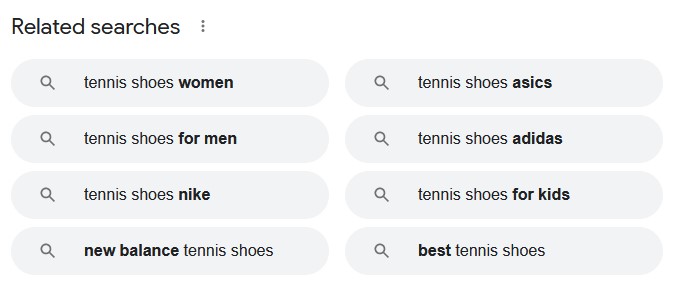
Include “people also ask” questions to your content:
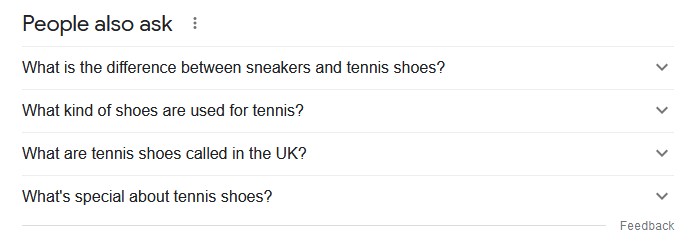
Check the tags that appear on Google images:
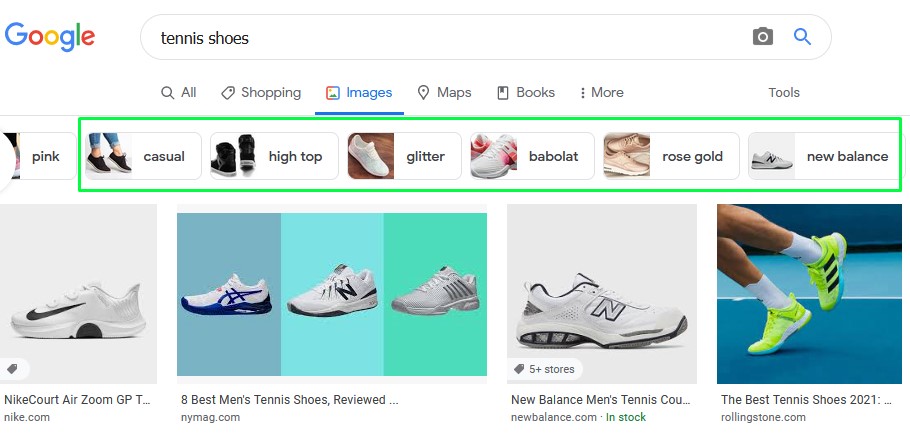
7. Add internal links strategically
Internal linking might be the most underestimated SEO strategy available.
In fact, adding internal links between related content could be the best way to increase topical relevancy.
You can either spend your time trying to get backlinks or focus on content creation.
And doing the latter will almost guarantee more internal links than external backlinks.
Why?
Because you have more control over the internal links you can create.
But, the real KPI needs to be blog revenue, not backlinks.
And income is down to how well you connect with the reader, build trust, and get them to take action.
If you fulfill the reader’s query and get them reading more related content, there’s a higher chance of conversion.
You can fulfill Google with relevancy between articles and fulfill your readers with more content.
To make this work, you need to create related pieces of quality content that fulfill an overarching outcome.
You can have 3 articles solving different things:
- How to choose the right tennis shoes
- How to improve form when serving
- Strength exercises for tennis players
And the overarching outcome could help the reader perfect their serve.
You’ll build more credibility with your audience and more topical relevance Google will love.
8. Replicate what already ranks
We’ve all heard the saying, “there’s no need to reinvent the wheel” and that couldn’t be more valid for SEO.
When looking at the first page of Google results, we can see what already works.
The only difference between each search result in the top 10 is how they present relevant information.
As long as you’ve got the right words on the page, you meet the search intent, and your domain has enough authority, then there’s more chance in ranking.
But, to beat the competition, improve what’s already ranking.
You can do this in a few ways:
- Add more supporting articles that link to the page in question
- Perform outreach to get more backlinks
- Improve the page design to make it more appealing to humans
- Add more value to the page with video, downloadable resources, checklists, etc.
Copying what already ranks won’t cut it. You need to be creative and understand what the reader wants and fulfill the Google algorithm at the same time.
9. Answer frequently asked questions
Google tracks every search and makes connections between the questions people ask and the queries they perform.
They even display these questions with the search results.
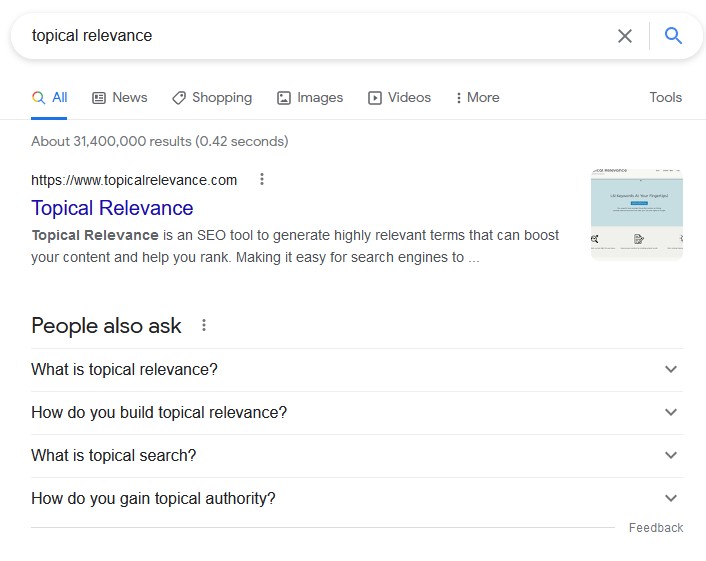
These questions are hyper-related to the search query and answering them will give you an edge in adding more topical relevance.
Topical Relevance Frequently Asked Questions
Topical authority is the perceived authority someone has in a market or niche.
You can usually increase your authority by increasing topical relevance, because your blog will show up for more terms.
What is semantic web SEO?
Semantic web SEO involves adding contextually related metadata to an article and providing more context within the body.
Why is topical relevance important?
Topical relevance is essential to help Google understand the content of your pages and articles.
Even though Google is getting smarter, it still can’t understand information the way humans can, so it uses an algorithm to know how words are related to each other.
Conclusion
That concludes this article on topical relevance.
In a nutshell, it means adding more relevance around a topic to help Google understand what your blog is about overall.
To do this, you can use content clusters, add strategic internal links (using an internal link checker), and use long tail keywords, to name a few.
Want to learn step-by-step how I built my Niche Site Empire up to a full-time income?
Yes! I Love to Learn
Learn How I Built My Niche Site Empire to a Full-time Income
- How to Pick the Right Keywords at the START, and avoid the losers
- How to Scale and Outsource 90% of the Work, Allowing Your Empire to GROW Without You
- How to Build a Site That Gets REAL TRAFFIC FROM GOOGLE (every. single. day.)
- Subscribe to the Niche Pursuits Newsletter delivered with value 3X per week
My top recommendations
















